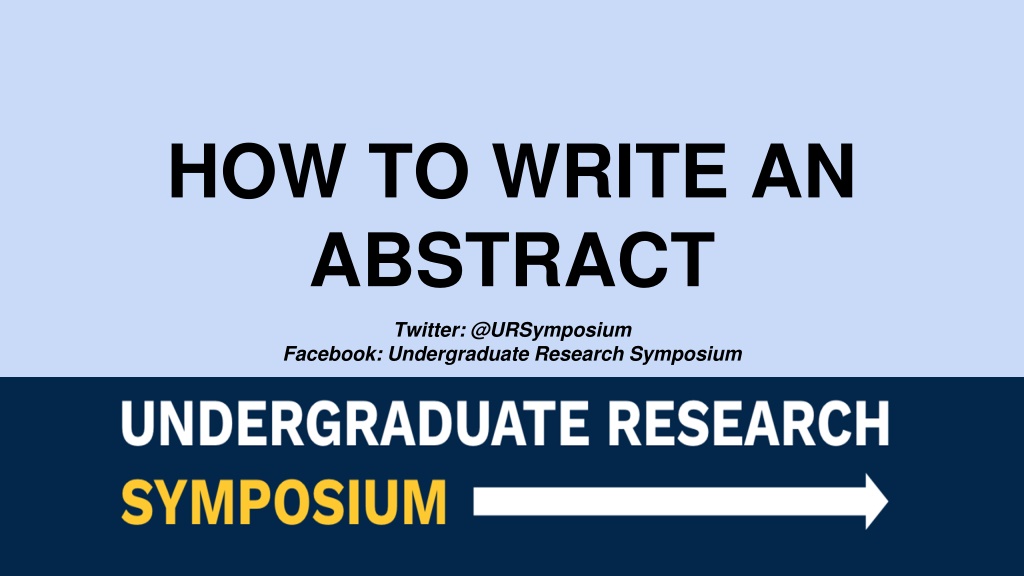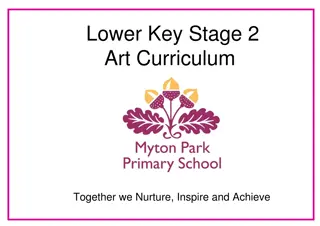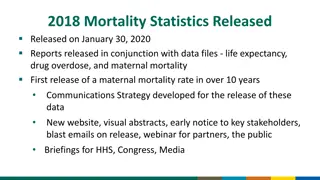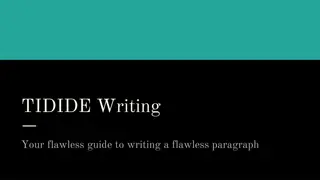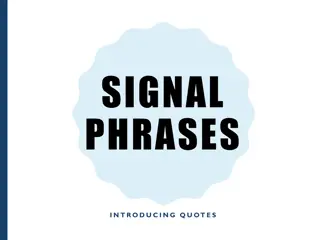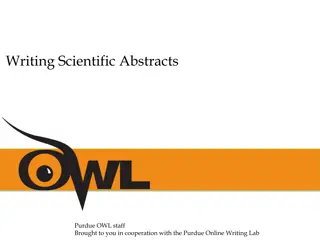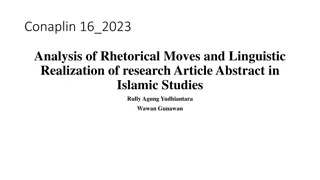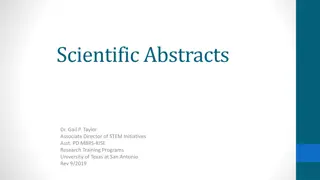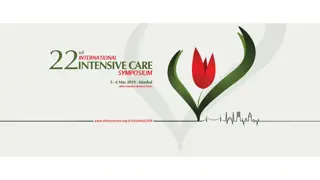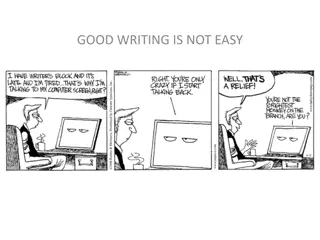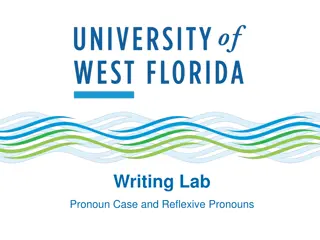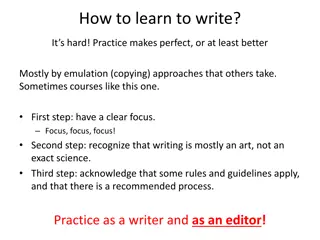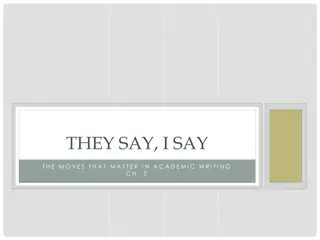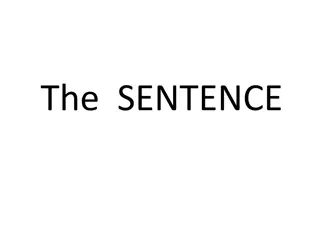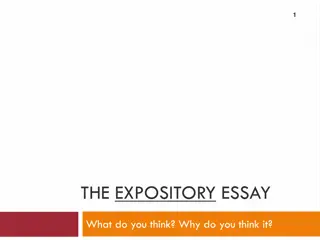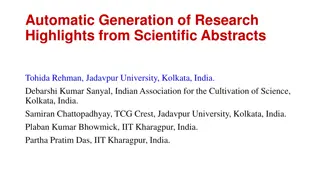Mastering the Art of Writing Effective Abstracts
Discover the essential elements and steps to craft a compelling abstract, essential for presenting research findings. Learn about different types of abstracts, word choice tips, and guidelines to include motivation, methods, results, and conclusion in your abstract effectively.
Download Presentation

Please find below an Image/Link to download the presentation.
The content on the website is provided AS IS for your information and personal use only. It may not be sold, licensed, or shared on other websites without obtaining consent from the author.If you encounter any issues during the download, it is possible that the publisher has removed the file from their server.
You are allowed to download the files provided on this website for personal or commercial use, subject to the condition that they are used lawfully. All files are the property of their respective owners.
The content on the website is provided AS IS for your information and personal use only. It may not be sold, licensed, or shared on other websites without obtaining consent from the author.
E N D
Presentation Transcript
HOW TO WRITE AN ABSTRACT Twitter: @URSymposium Facebook: Undergraduate Research Symposium
UNDERGRAD RESEARCH SYMPOSIUM Who: Open to all undergraduates who are involved in research (on-campus or off- campus). Why: To our knowledge, there is no other forum on campus open for undergraduate researchers of all disciplines to present their work except for the UROP symposium, which is limited to UROP students (freshmen and some sophomores). What: An opportunity for undergraduate researchers to... Showcase their work to peers and faculty members through poster presentations Win travel awards that support costs associated with attending research conferences. When: Friday, April 8th, 2022 Where: Atrium in the Willard H Dow Chemistry Building @ UM-Ann Arbor
BACKGROUND: WHY ABSTRACTS? That is, while even the most skillful writing cannot turn bad science into good science, clear and compelling writing makes good science more impactful, and thus more valuable. -Kevin W. Plaxco
TYPES OF ABSTRACTS DESCRIPTIVE a) Background, minimal results *INFORMATIVE a) Includes all relevant information in the paper: intro, importance, brief results, conclusion. STRUCTURED - paragraph per section of information NON-STRUCTURED - no specific format to information flow *SEMI-STRUCTURED - sentence per section (1 paragraph)
WORD CHOICE: Concise Easy to understand: use common words over the complicated ones. Few abbreviations Watch tense Use precise language
IN GENERAL: ELEMENTS TO INCLUDE 1. Motivation/problem statement: Why is your research/argument important? What practical, scientific, theoretical or artistic gap is your project filling? 2. Methods/procedure/approach: What did you actually do to get your results? (e.g. analyzed 3 novels, completed a series of 5 oil paintings, interviewed 17 students) 3. Results/findings/product: As a result of completing the above procedure, what did you learn/invent/create? 4. Conclusion/implications: What are the larger implications of your findings, especially for the problem/gap identified previously? Why is this research valuable?
WRITING AN ABSTRACT IN 6 STEPS: Step 1 Step 1: Introduction. In one sentence, what s the topic? Phrase it in a way that your reader will understand. Example: There are many cookbooks that have banana bread recipes. Adapted from: How to write a scientific abstract in six easy steps
WRITING AN ABSTRACT IN 6 STEPS: Step 2 Step 2: State the problem you tackle. What s the key research question? If you can t summarize your thesis/paper/essay in one key question, then you don t yet understand what you re trying to write about (Which is OKAY!). Keep working at this step until you have a single, concise (and understandable) question. Example: However, it is hard to know which recipe to follow. Adapted from: How to write a scientific abstract in six easy steps
WRITING AN ABSTRACT IN 6 STEPS: Step 3 Step 3: Summarize (in one sentence) why nobody else has adequately answered the research question yet. Don t cover all the various ways in which people have tried and failed Explain that there s this one particular approach that nobody else tried yet (hint: it s the thing that your research does): phrase it in such a way that it s clear it s a gap in the literature. Example: It is arduous to make every banana bread and relying on reviews of recipes can be untrustworthy due to differing taste preferences of the reviewer. Adapted from: How to write a scientific abstract in six easy steps
WRITING AN ABSTRACT IN 6 STEPS: Step 4 Step 4: Explain, in one sentence, how you tackled the research question. What s your big new idea? what s the new perspective you have adopted? What s your overall view on the question you introduced in step 2?) Example: Herein, we made 100 different banana bread recipes and had 3 individuals bake and rate each recipe. Adapted from: How to write a scientific abstract in six easy steps
WRITING AN ABSTRACT IN 6 STEPS: Step 5 Step 5: In one sentence, how did you go about doing the research that follows from your big idea. Did you run experiments? Build a piece of software? Carry out case studies? Don t overdo it we re still looking for a sentence that you could read aloud without having to stop for breath. The word abstract means a summary of the main ideas with most of the detail left out. Example: Each baker rated each recipe on a scale of 1 5 in four different categories: taste, appearance, difficulty and a comparative analysis of taste and difficulty. Adapted from: How to write a scientific abstract in six easy steps
WRITING AN ABSTRACT IN 6 STEPS: Step 6 Step 6: As a single sentence, what s the key impact of your research? Here we re not looking for the outcome of an experiment: We re looking for a summary of the implications. What does it all mean? Why should other people care? What can they do with your research. Example: This study will help bakers chose which banana bread recipe they should follow and will help inform the design of future recipe review studies. Adapted from: How to write a scientific abstract in six easy steps
WRITING AN ABSTRACT IN 6 STEPS: All together There are many cookbooks that have banana bread recipes. However, it is hard to know which recipe to follow. It is arduous to make every banana bread and relying on reviews of recipes can be untrustworthy due to differing taste preferences of the reviewer. Herein, we made 100 different banana bread recipes and had 3 individuals bake and rate each recipe. Each baker rated each recipe on a scale of 1 5 in four different categories: taste, appearance, difficulty and a comparative analysis of taste and difficulty. This study will help bakers chose which banana bread recipe they should follow and will help inform the design of future recipe review studies. 110 words- yours will likely be longer as the research is more complex (and real!) Adapted from: How to write a scientific abstract in six easy steps
URS APPLICATION SUBMISSION PROMPT: Please copy and paste your research abstract in the text box below. Abstracts are due February 25th, 2022. (250 word limit) * What are we looking for? - - - Between 150-250 words Describes your research project concisely and accurately An indication of how far along you intend to be by the symposium (note that projects at all stages can be presented on)
Abstract Writing Resources The writing centers throughout the campuses have peers and advisors who are great resources for aid in editing abstracts! UM Ann Arbor: Sweetland Writing Center UM Dearborn: Writing Center UM Flint: Marian E. Wright Writing Center
THANK YOU! QUESTIONS??
